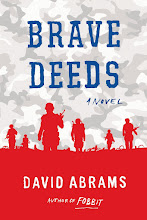My First Time is a regular feature in which writers talk about virgin experiences in their writing and publishing careers, ranging from their first rejection to the moment of holding their first published book in their hands. Today’s guest is Sam Thomas, author of the historical mystery The Midwife's Tale, released earlier this month by Minotaur Books (an imprint of St. Martin's Press). Thomas teaches history at University School, an independent day school outside Cleveland, Ohio. He previously taught at the college level for seven years, and received research grants from the National Endowment for the Humanities, the Newberry Library, and the British Academy. He lives in Shaker Heights, Ohio with his wife and two sons. Visit his website here, and check out this recent Cleveland Plain Dealer article for more background on how Thomas came to write The Midwife's Tale.
The First Time I Met My Character
My road to publishing The Midwife's Tale began more than ten years ago when I was in England working on my doctoral thesis. It was there that I met Lady Bridget Hodgson for the first time. I was reading hundreds and hundreds of wills written in the city of York between 1660 and 1690. And while I know it sounds dull, wills are actually quite wonderful. Many are formulaic, but from time to time they reveal tantalizing glimpses of familial conflict and dysfunction; what could be more fun than that?
For example, when a former Lord-Mayor of York named Thomas Hodgson died, he divided his enormous estate among his sons Rowland, Richard, and George. His other son Phineas didn’t do as well: “I give unto my son Phineas Hodgson in full satisfaction of his filial child’s part and portion the sum of ten pounds of lawful English money [because] he hath been so chargable to me.”
That’s it. No explanation, no back story, no nothing. We know Phineas blew through his inheritance before his father died, but the rest is left to our imagination. What more could a writer want?
But before I discovered Phineas’ profligacy and Thomas’ retribution, I found Phineas’ wife, the Lady Bridget Hodgson. As it turns out, her will (which you can read here) is even better than Thomas’, for it starts with words that are now inscribed upon my heart: “In the name of God Amen, I Bridget Hodgson of the City of York, Midwife…”
As the saying goes, she had me at Midwife, because in the seventeenth century women were defined by the men in their lives. They described themselves as wife, widow, or spinster, and in all the months I’d been reading wills, I’d never come across a woman who said, “Screw that. I’m nobody’s wife or widow. I’m a midwife.” Yet there she was.
And she was only just getting started.
After naming the men she wanted to carry her to her grave (aldermen, lawyers, and Members of Parliament – a veritable Who’s Who of city politics!), Bridget lists her godchildren.
Dull but essential side note here: In the early modern period, godparents chose the names of their godchildren. Obviously they did this in consultation with the parents, but as we’ll see there can be more to the story.
That item from Bridget’s will is worth quoting in full:
I give unto the several persons hereafter named for whom I was Godmother ten shillings apiece, to wit: Bridget Swain, Bridget Ascough, Bridget Morris, Bridget Wilberfoss, Thomas Robinson, Edward Watson, and Thomas Horsley.I imagine those around me thought I was having a seizure when I read this. She named her goddaughters – each and every one of them – after herself! What kind of woman names other people’s kids after herself?
Oh, and one more bequest:
I also give unto my daughter Bridget my coral necklace and bracelets…and also a sealed ring of gold with my late husband’s coat of arms and my own engraven on the same.By the time she died, Bridget had named five girls after herself. (Was she putting together a basketball team? If so, what would they call each other? Who knows? But it’s awesome.)
To say the least, this encounter with a woman four centuries dead changed my life.
After this, I started writing about the history of midwifery and childbirth, and published a couple of academic articles. And when I decided to leave academia, I went back to Bridget and built my first novel, The Midwife’s Tale, around a fictionalized version her.
The crazy thing about all this is how lucky I was. While doing research for my thesis, I realized there was no way I could read every will, so I chose those who passed through probate in June and December, and Bridget's will happened to have been processed in June. If she had died in May rather than June, or if she’d died suddenly and without a will, or if she had remarried and left her estate to her husband, I would never have met her. Lives can turn on these tiny moments, and mine was transformed by a random encounter with woman four hundred years dead.
The world is a funny place, isn’t it?















Fascinating! I must read this novel.
ReplyDeleteIndeed it is.
ReplyDelete